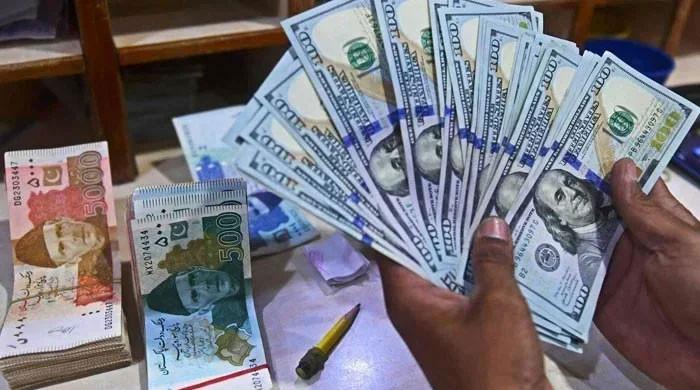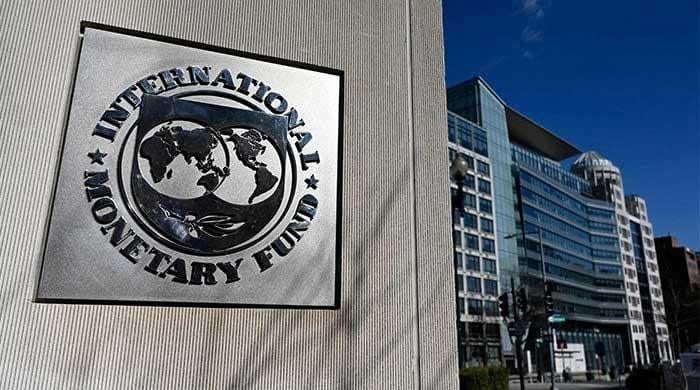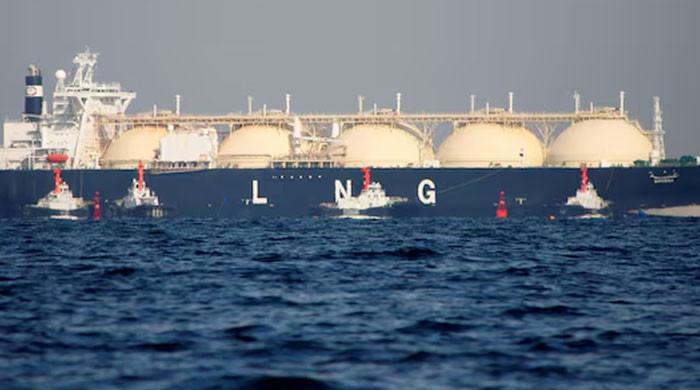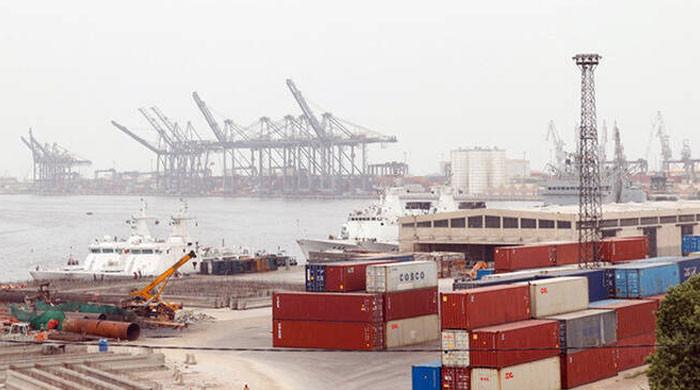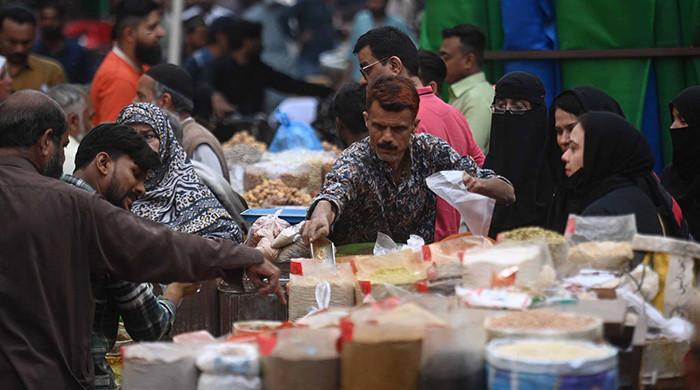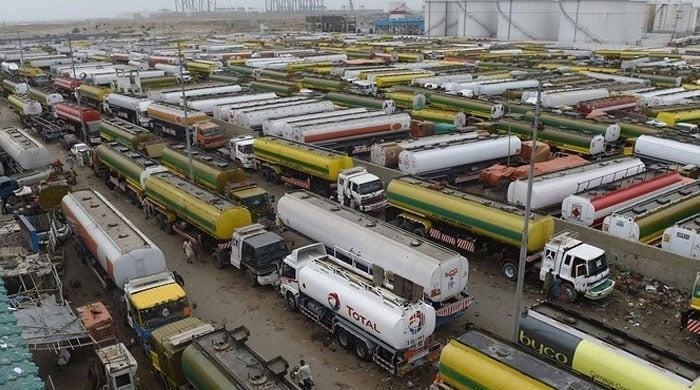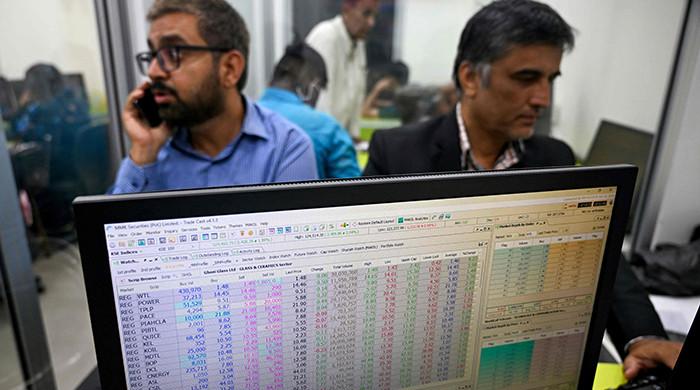Govt set to raise defence budget, says Planning Minister Ahsan Iqbal
Govt to prioritise hydro projects and public relief in upcoming federal budget
May 25, 2025
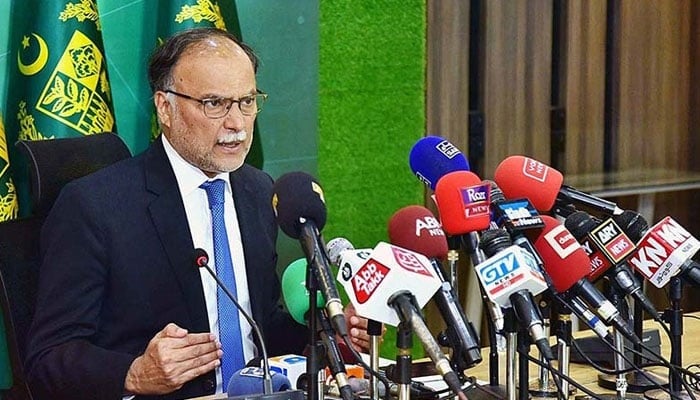
- Defence budget increase linked to national security priorities.
- No IMF pressure on federal budget, says Ahsan Iqbal.
- Water projects prioritised in response to Indian aggression.
ISLAMABAD: Minister for Planning Ahsan Iqbal has confirmed that the defence budget will be increased in the upcoming fiscal plan, while also assuring that the government intends to provide relief to the public, The News reported on Sunday.
He added that there was no pressure from the International Monetary Fund (IMF) regarding the finalisation of the budget.
Addressing a delegation of engineers led by the Institution of Engineers Pakistan (IEP) Secretary General, Engineer Ameer Zameer, Iqbal said that water-related projects are being prioritised in response to India’s water-related aggression.
He added that dedicated funds would be allocated to such projects on a priority basis to ensure the country’s long-term water security.
Iqbal said the government will ensure the early completion of all hydro-related projects, including the Diamer-Bhasha Dam, to prevent India from taking advantage.
Iqbal clarified that the delay in the upcoming federal budget is due to the prime minister’s foreign visit and the Eid holidays, not due to any pressure from the IMF. He stressed that there was no IMF pressure on the budget, and the government was committed to offering relief to the people.
He also stated that the security situation demands an increase in the defence budget and announced the introduction of a paid internship programme for young engineers.
The planning minister reassured the engineers that their demands would be incorporated into the upcoming budget and expressed satisfaction that the IMF was content with the government’s economic policies.
Regarding political matters, he said the country remained united following the recent military success against India.
He criticised the PTI founder, saying the response to COAS Field Marshal Syed Asim Munir’s recognition for exemplary leadership has not been positive from Imran Khan.
He concluded by stating that the government will not take any step that harms national unity or cohesion.
Meanwhile, Pakistan and the IMF continued parleys for finalising the upcoming budget amid FBR’s proposal to reduce rates of taxable slabs of salaried income by 2.5%.
The IMF staff inquired about the ‘alternate measures’ only on the income tax side to bridge the gap of Rs56 billion arising due to the proposed relief for the salaried class in the next budget.
Although, the IMF did not agree to increase the taxable ceiling from Rs0.6 million to Rs1.2 million but there is a proposal under consideration to decrease the rate of this slab to just a token rate of 1% from the existing rate of 5%.
For all remaining slabs up to 35%, the maximum slab is proposed to be reduced to 32.5%. There is a surcharge for income earners of Rs1 million per month at a rate of 10%. There is also a Super Tax on higher income brackets, so it is proposed to be reduced gradually.
On the expenditure side, it is under consideration to increase the salaries of defence/military officials, and different proposals are under consideration in this regard. The civilian side salary and pension will also be increased, but it will be in line with the proportion of CPI-based inflation.
Keeping in view pressing requirements of the overall defence budget as well as increasing their salaries, the FBR’s tax collection target for the next budget might be jacked up from Rs14.05 trillion to Rs14.2 trillion, but the finalised revenue collection figure was still underway because it hinges upon expenditure side requirements of the Ministry of Finance.
According to the IMF announcement on Saturday, the Fund’s mission, led by Nathan Porter, has concluded its staff visit to Islamabad, which began on May 19. The staff visit focused on recent economic developments, programme implementation, and the budget strategy for fiscal year (FY) 2026.
The IMF, in its disclaimer, stated on its website that these end-of-Mission press releases include statements of IMF staff teams that convey preliminary findings after a visit to a country. The views expressed in this statement are those of the IMF staff and do not necessarily represent the views of the IMF’s Executive Board. This mission will not result in a Board discussion.
At the end of the visit, Nathan Porter stated, “We held constructive discussions with the authorities on their FY2026 budget proposals and broader economic policy, and reform agenda supported by the 2024 Extended Fund Facility (EFF) and the 2025 Resilience and Sustainability Facility (RSF).
The Pakistani authorities reaffirmed their commitment to fiscal consolidation while safeguarding social and priority expenditures, aiming for a primary surplus of 1.6% of GDP in FY2026.
Discussions focused on actions to enhance revenue — including by bolstering compliance and expanding the tax base — and prioritise expenditure. We will continue discussions towards agreeing over the authorities’ FY26 budget over the coming days.
Discussions also covered ongoing energy sector reforms aimed at improving financial viability and reducing the high-cost structure of Pakistan’s power sector as well as other structural reforms which will help foster sustainable growth and promote a more level-playing field for business and investment.
The authorities also emphasised their commitment to ensuring sound macroeconomic policy-making and building buffers. In this context, maintaining an appropriately tight and data-dependent monetary policy remains a priority to ensure inflation is anchored within the central bank’s medium-term target range of five to 7%.
At the same time, rebuilding foreign exchange reserve buffers, preserving a fully functioning FX market, and allowing for greater exchange rate flexibility are critical to strengthening resilience to external shocks.
The mission thanked the federal and provincial authorities for their hospitality, constructive discussions and strong collaboration and commitment to sound policies.
The IMF team will remain engaged and continue its close dialogue with the authorities. The next mission associated with the next EFF and RSF reviews is expected in the second half of 2025, the statement concluded.
The sources said that the IMF asked for alternate options to bridge the gap of Rs56 billion if tax rates for the salaried class are reduced. The FBR proposed some GST measures, but the IMF did not agree to that.
Then the FBR proposed two measures to increase the Withholding Tax on imports by 2%, except raw material and secondly, raise the Capital Gain Tax (CGT) for companies from 15 to 20 and 25%.
The IMF side argued that on the one side, the government would implement a new tariff policy, and then the WHT rate is proposed to be increased, which is contradictory. Secondly, the CGT hike for companies will further increase tax burden of corporate sector.
Meanwhile, World Bank (WB) Managing Director for Operations Anna Bjerde has concluded a two-day visit to Pakistan. The global lender announced here on Saturday that during her visit, Anna Bjerde commended the authorities for the reform momentum and stressed the need for continuity in implementation to sustain economic stability and elicit a stronger private sector investment and growth response.
Bjerde met with Prime Minister Shehbaz Sharif and expressed her appreciation for collaboration on the new 10-year World Bank Group Country Partnership Framework with Pakistan. They also discussed the need for coordinated reforms at the federal and provincial levels to ensure sustained and inclusive growth.
“Pakistan’s path to sustainable economic recovery and poverty alleviation rests on comprehensive reforms that prioritise human capital, macroeconomic stability, climate resilience, sustainable energy and private sector growth,” Bjerde said.
“During my visit, we discussed the next steps on the reform agenda of the government, especially in the fiscal, digital and energy sectors, as well as the potential of the country in terms of private-led growth and entrepreneurship, particularly to create quality jobs for women and youth.”
She also met Minister of Economic Affairs and WB Group Governor Ahad Khan Cheema, Minister of Finance and Revenue Muhammad Aurangzeb, Minister for Planning, Development and Special Initiatives Ahsan Iqbal, Minister of Energy (Power Division) Sardar Awais Laghari, Minister for Poverty Alleviation and Social Safety Syed Imran Ahmad Shah, Benazir Income Support Programme Chairperson Rubina Khalid, Federal Board of Revenue Chairman Rashid Mahmood Langrial, members of the National Assembly, Senate, women leaders and other senior government representatives.
The discussions focused on implementing the Country Partnership Framework to help address the most critical socio-economic challenges of the country, in terms of human capital development, particularly for women and girls, access to water and sanitation, climate resilience, natural disaster risk reduction and the foundations of private-led growth and job creation.
Bjerde had the opportunity to visit the WB-supported project sites in Shaheed Benazirabad District in Sindh, where she was accompanied by Sindh Chief Minister Murad Ali Shah and Sindh Minister of Health Dr Azra Fazal Pechuho. She and the WB delegation were hosted by the First Lady of Pakistan and Member of the National Assembly Aseefa Bhutto Zardari.
The visit included meetings with beneficiaries and staff of the 2022 Sindh Flood Emergency Housing Reconstruction Project, as well as an exchange with the medical staff and female patients of a Basic Health Unit supported by the National Health Support Programme.
While in Sindh, Bjerde exchanged with Chief Minister Shah and members of his cabinet on ongoing and planned projects to support the development of the province.





